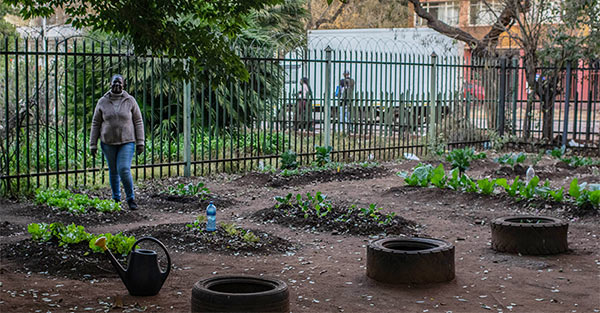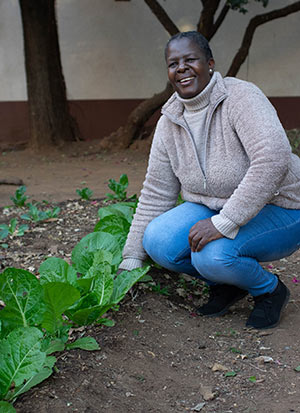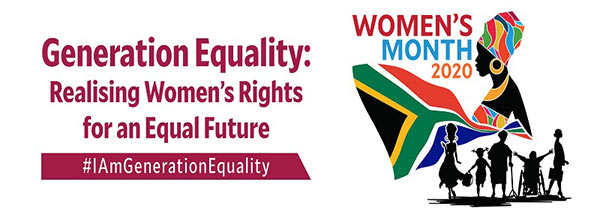
The African college of excellence in the social and human sciences
The Unisa Department of Christian Spirituality, Church History and Missiology in the College of Human Sciences has since 2011 been conducting their Meal of Peace community engagement project. The project, which started when Dr Philemon Beghela and his wife Pauline, an alumnus doctoral student of the department, would ensure that every Sunday a "Meal of Peace" was shared with homeless people in Tshwane’s mid-city. According to the Department’s Prof Annalet van Schalkwyk, Beghela, a minister in the Mennonite Church, ensured that through the tradition of meal sharing, there was a strong focus on peace-making in situations of violence, social injustice and inequality.

Selly Mathonsi is the caretaker of the Peace Garden in the yard of the historic Burgers Park Caretaker House in the Tshwane CBD.
"For him, sharing a meal with the homeless meant that he wanted to share in a small way the possibility of peace, wellbeing, community and justice with the homeless community of Tshwane. This project was extended to an annual Meal of Peace event," explains Van Schalkwyk.
She says that the department has now developed the project further by conducting Contextual Bible Studies (CBS) with homeless people on societal issues. In October 2019, she took her Bible Study with a group of men and women one step further. "After the Bible Study, the participants started a food garden in the yard of the historic Burgers Park Caretaker House, in the centre of the Tshwane CBD. Selly Mathonsi, who is the housemother of the house, became the caretaker of the Peace Garden. Her background with gardening made her the ideal person to take the Peace Garden further, into the Covid-19 lockdown of 2020."
Van Schalkwyk believes that it is women like Mathonsi who are the true heroes of their communities and whose stories need to be told. Mathonsi’s story begins in Mpumalanga, where she was born and raised in the small village Acornhoek, next to Bushbuckridge. She was the last born of six children who were raised by a single mom. At an early age, she received the calling to go into Christian ministry and after matric she went to the Union Bible College in Pietermaritzburg. Here she studied for a three-year diploma in theology. In 1999, she was appointed in her local church in Phalaborwa to work with children. In 2000, she was appointed to minister to the whole church. While she was working with children, she started gardening.
"The church had a huge yard, and we worked in the garden during school holidays and weekends. We grew green beans, spinach, beetroot, many different vegetables and fruits. In this way, we were able to raise money for the expenses for the youth ministry. We invited other churches in their area to come and buy from us," says Mathonsi.
 At home, in Acornhoek, Mathonsi explains that her mum did not have employment; she stayed at home and gardened and sold vegetables at the market. "Gardening was a way of life. It was our culture. We planted mealies and ground it. It made the best bread. We also planted African potatoes and sweet potatoes. We ate from the garden and we were very healthy. We raised money from our garden. We were self-sufficient and could take care of ourselves. People from Tzaneen would come to our place to buy the young mangoes to make atchar."
At home, in Acornhoek, Mathonsi explains that her mum did not have employment; she stayed at home and gardened and sold vegetables at the market. "Gardening was a way of life. It was our culture. We planted mealies and ground it. It made the best bread. We also planted African potatoes and sweet potatoes. We ate from the garden and we were very healthy. We raised money from our garden. We were self-sufficient and could take care of ourselves. People from Tzaneen would come to our place to buy the young mangoes to make atchar."
When Mathonsi’s mother passed away in 1995, she went to live with her aunt, who also was a gardener. They had various fruit trees: orange, litchi, avocado and guava. They sold mangoes and vegetables for money to buy what they needed in their household. They also ate the vegetables from the garden. The story is that Mathonsi had "green fingers", because as soon as she would plant something, it would grow and the garden would be green and full of colours.
"It renews your mind," says Mathonsi, adding, "You feel relaxed and happy when you are in the garden. And when the spinach and potatoes are growing, you are happy because you are benefiting; you are eating from the garden. The soil produces food and you think 'wow, it comes from the soil and I can eat this'. You learn to value the soil because there is life in the soil. The soil gives you food and you have to take care of the soil."
Mathonsi arrived at the Tshwane Leadership Foundation (TLF) in July 2009, where she started to work as a housemother at Potter’s House for Women in Crisis. In 2012, she became an outreach worker to women in Marabastad, the prisons and Weskoppies Mental Health Hospital. "I like outreach work. Now I do counselling and testing for HIV at Gilead Health Unit and Rivoningo Care Centre for Terminally Ill Patients. I am housemother at Burgers Park House. We had some German volunteers who stayed here but they went home. In April 2020 under the Covid-19 lockdown, the homeless women came to stay here and I continued as the housemother."
Mathonsi explains that through the Meal of Peace project and the Bible Study in 2019, she and Van Schalkwyk started working together on the Peace Garden. "We started about eight sheet-mulch beds on the eastern side of the house. The TLF personnel are so excited and are looking forward to the time when we will produce food for all of us. At the moment only the women from Burger’s Park House eat from it," she says.
Mathonsi adds: "The women who are staying with me right now are eager to help with the garden. Some are from rural backgrounds and have a background in gardening. The garden is therapeutic for the women. They spend a lot of time there. Sometimes they just sit next to the garden and relax."
Furthermore, Mathonsi says: "Even if this garden is a small start, it has a message to people, especially during Women’s Month 2020 and in this time of Covid-19. There is life in the soil that God gave us. Our soil produces life - food, for us to live from. Different vegetables grow in the soil and our bodies need it to be healthy. In this time, health workers are encouraging us to eat healthily so that we can boost our immune systems and can withstand the Covid-19 virus."
She advises Unisa stakeholders to create gardens wherever they find a space to do so. "Whatever you have, even a small place, use it wisely and plant a vegetable garden, so that you can be healthy, in this time. Let us develop this mentality during lockdown that we garden and produce food. Gardening also helps you to release your stress. If we gardening we can generate our own health, wealth, and money in this time that many people are losing their jobs and are hungry."
Mathonsi provides an example of her cousin in Giyani who has a plot and produces ample food that she is able to export to the neighbouring countries, and sells to the Spar and other big supermarkets. "This is what she is doing during lockdown. She also employs people. This is what women can be doing in this time. Gardening is empowering and women have been gardening in Africa for a very long time. Why can’t we do it again?"
For further information about food gardening during Covid-19, you can connect with the South African Food Sovereignty Campaign, the Gauteng Community Action Network Food Growers WhatsApp group, and The Ubuntu Project.
* Submitted by Annalet van Schalkwyk, Department of Christian Spirituality, Church History and Missiology, and initial edit by Rivonia Naidu-Hoffmeester, Communications and Marketing Specialist, College of Human Sciences

Publish date: 2020-08-26 00:00:00.0